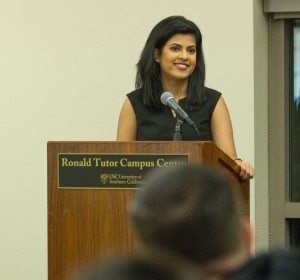Sampath delivers State of the Student Body

State of the student union · Sampath reflected upon the accomplishments of the student government over the course of last semester and how they reflect her future goals for the University. – Joseph Chen | Daily Trojan
Student advocacy and activism was the focus of Undergraduate Student Government President Rini Sampath’s first-ever State of the Student Body address delivered Tuesday evening in the Ronald Tutor Campus Center.
Sampath began the speech by recapping last year’s accomplishments.
“The year 2015 was so significant for our student government and our campus,” Sampath said. “Our advocacy work saw results.”
Sampath thanked student leaders for their work in launching the Campus Climate Resolution, a campaign to resolve diversity and inclusion issues on campus. The resolution was in-step with similar movements at universities across the U.S., spurred on by incidents of discrimination at the University of Missouri.
The address recalled the huge shifts in student engagement, which culminated in several impassioned Senate meetings toward the end of the semester.
“With some of the highest attended Senate meetings in USC history, we saw a tremendous increase in campus engagement on hot-button topics,” Sampath said.
Sampath also thanked senior administrators Provost Michael Quick and Vice President for Student Affairs Ainsley Carry, who held an impromptu meeting with students leaders in November of last year after protests outside of Bovard Auditorium.
“There are students whose voices aren’t heard due to the disconnect that has existed between our student body and our senior administration,” Sampath said. “In this past year, I believe we were generally able to begin to bridge this gap by elevating the voice of those that have been left in the shadows.” Sampath said.
Sampath returned to the concept of the “invisible Trojan” to highlight disparities in the student experience at USC.
“The invisible Trojan — sexual assault survivors, students living with mental illnesses, transfer students, students from low-income communities, students from the queer community and more are left on the fringes,” Sampath said. “Firmly incorporating these individuals into the forefront of the USC community will bring us closer to the idea of a perfect USC.”
After the address, Senator Giuseppe Robalino asked Sampath about the national attention brought to the university by the advocacy work.
Sampath responded by highlighting the strength of an outspoken student body.
“If we turn a blind eye to [these issues], we are doing an injustice as student leaders,” Sampath said.
Sampath linked the advocacy work at USC to efforts by students across the country to address issues of diversity and inclusion.
“We need people to participate,” Sampath said. “I’m so glad we played our role in a nationwide movement.”
